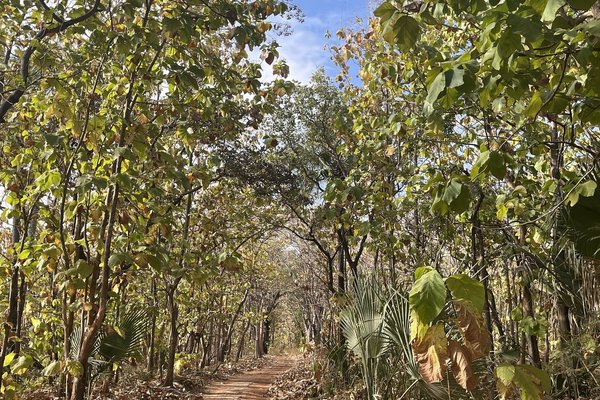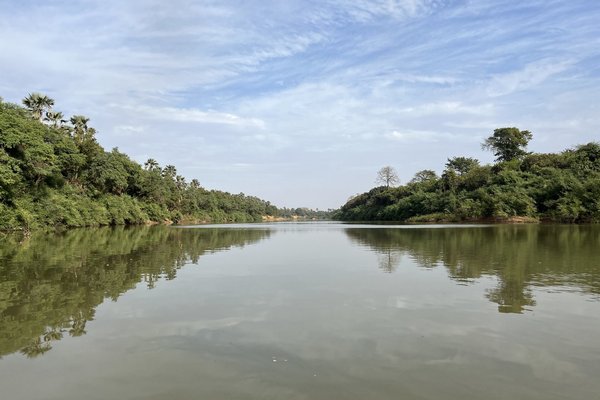Senegal
Niokolo-Koba National Park
Niokolo-Koba National Park on the banks of the Gambia and other rivers is known for its diversity of wildlife.
Most of the park consists of relatively flat woodland savannah and semi-arid Sudanese forest, intermingled with wetlands. Wildlife, in numbers unique for this region, includes (at the time of inscription) elephants, lions, leopards, chimpanzees, baboons, hippopotamuses and the derby eland.
Community Perspective: The park was labelled “great” by our first reviewer, who visited in 2006 and 2008. More recently, however, the park has suffered from a severe loss in wildlife numbers due to poaching (IUCN Outlook 2020). Els in 2025 found it hard to reach areas with at least some animal activity.
Site Info
Official Information
- Full Name
- Niokolo-Koba National Park (ID: 153)
- Country
- Senegal
- Status
-
Inscribed 1981
Site history
History of Niokolo-Koba National Park
- 2024: Removed from Danger list
- 2007: In Danger
- Critically low mammal populations, the ongoing management problems and the impacts of the proposed new dam on the Gambia river a few kilometres upstream of the park
- 1981: Inscribed
- Inscribed
- Type
- Natural
- Criteria
- x
Links
- UNESCO
- whc.unesco.org
- Official
-
- au-senegal.com — Practical Info by Au Sénégal tourism portal
- niokolo-safari.com — Official website of the guide organization at Niokolo
- Related
-
- mammalwatching.com — Mammalwatching trip report from 2018
All Links
UNESCO.org
- whc.unesco.org — whc.unesco.org/
Official Website
- au-senegal.com — Practical Info by Au Sénégal tourism portal
- niokolo-safari.com — Official website of the guide organization at Niokolo
Related Resources
- mammalwatching.com — Mammalwatching trip report from 2018
News Article
- April 18, 2024 whc.unesco.org — Towards the removal of Niokolo-Koba National Park from the List of World Heritage in Danger: UNESCO supports Senegal’s National Parks Department
- June 11, 2021 worldatlas.com — Rare Wildlife Images From Niokolo Koba National Park Give Birth To New Hope
- Nov. 25, 2009 afriquejet.com — Niokolo Koba Park in peril
Community Information
- Community Category
- Wildlife habitat: Fauna
Travel Information
Recent Connections
-
Protection of a single named species
"Koba" refers to Buffon's kob, a specie… -
Named after a River
Niokolo-Koba RiverSee en.wikipedia.org
-
Foreigner prices
3000 XOF for Senegalese, 5000 for forei…
Connections of Niokolo-Koba National Park
- Geography
-
-
Contiguous National Sites
Bassari Country (Bassari Salémata), via the buffer area, with Niokolo-Koba National Park -
On National Border
On Guinea border -
Gambia River Basin
The Park is named after the Niokolo-Koba, a major tributary of the Gambia which also flows through the park - "Located in a well-watered area along the banks of the Gambia rive" (UNESCO desc)
-
- Trivia
-
-
Dubbed as another WHS
"there is no doubt Niokolo-Koba could be nourished into the ‘Serengeti of West Africa.’"See panthera.org
-
- Ecology
-
-
Over 300 bird species
329 (Crit X) -
Chimpanzee habitat
"Other endangered species present include chimpanzees..." (AB ev); 626 chimpanzee nests found at Mt. Assirik (2024) -
Reintroduced Species
"The elephants are a recent reintroduction, after an earlier herd of several hundred was killed off." from IUCN -
Elephants
African elephant -
Turtles and tortoises
four tortoise species -
Strepsirrhini
Senegal bushbaby, potto -
Hippos
"6000 hippopotamuses" (wiki)See en.wikipedia.org
-
Savanna
"the Niokolo-Koba National Park is sufficiently vast as to illustrate the major aspects of the Guinean savanna-type ecosystem" (integrity statement) -
Crocodiles
all three African crocodiles and dwarf crododile -
Lions
Not enough data for estimation of Lion population, but "93 observations involving 253 lion sightings were made by NKNP guides and their clients over a period of four and a half years in the central tourist area of the Park which represents about 3% of the total area of NKNP." (see link) -
African Wild Dog
"The West African wild dog used to be widespread from western to central Africa, from Senegal to Nigeria. Now only two subpopulations survive: one in the Niokolo-Koba National Park of Senegal and the other in the W National Park of Benin, Burkina Faso and Niger. It is estimated that 70 adult individuals are left in the wild" (Wiki) -
Eagles
Martial eagle and Bateleur eagle (wiki)See en.wikipedia.org
-
- Damaged
-
-
Poaching
considerable poaching of elephants. -
'Threatened' by Dams
Sambangalou Dam
-
- World Heritage Process
-
-
Perfect Inscriptions
1981 -
Former In Danger List sites
2007-2024
-
Inscribed on a single criterion only
x. to contain the most important and significant natural habitats for in-situ conservation of biological diversity, including those containing threatened species of outstanding universal value from the point of view of science or conservation.
-
- Human Activity
-
-
Indigenous groups expelled
"The park was founded in 1954 as a means to conserve the area’s high biodiversity. It was later expanded in 1969, and now encompasses 9130km2. The establishment of the park led to the abandonment of 18 villages, which were relocated outside of the conservation area. The population of these villages either established entirely new settlements around the park or were integrated into pre-existing, traditional villages"
-
- WHS on Other Lists
-
-
World Heritage Forest Programme
-
Plant WHS not in a CPD
"The wealth of habitats should be noted, along with the diversity of flora, with over 1,500 important plant species." (OUV) -
World Biosphere Reserves
Niokolo-Koba (1981)
-
- Visiting conditions
-
-
Foreigner prices
3000 XOF for Senegalese, 5000 for foreigners
-
- WHS Names
-
-
Named after a River
Niokolo-Koba RiverSee en.wikipedia.org
-
Protection of a single named species
"Koba" refers to Buffon's kob, a species of African antelope (Wolof koba, Fulani kōba)
-
News
- whc.unesco.org 04/18/2024
- Towards the removal of Niokolo-Kob…
- worldatlas.com 06/11/2021
- Rare Wildlife Images From Niokolo …
- afriquejet.com 11/25/2009
- Niokolo Koba Park in peril
Community Reviews
Show full reviews
Like Bulgaria, Senegal was quick off the mark, resulting in some WHS getting in early which are questionable now. Niokolo-Koba, named after the Niokolo (Koba) River and the Kob antelope, is an enormous park in the east of the country. At its inscription it was rich in mammals including “a large population of elephants”, but after decades of poaching (which has been curtailed only in recent years), few of that is left. It has chimps, lions and other location-specific mammal species that are clinging on to existence and are heavily supported by conservation NGOs such as Panthera. Still, it’s remarkable considering the circumstances that such small and isolated populations have managed to survive for so long in West Africa.
Don’t expect to see them though, those elephants or lions which are so numerous in Southern and Eastern Africa – there are only a dozen or so here in a fairly inaccessible park. For a reality check, I recommend reading this trip report of someone who stayed in the park for 2 weeks in 2018 looking for wild dogs but saw none (no wild dogs, no lions, no elephants). Also, the park seems to leave the more interesting parts such as Mt Assirik to scientists only.
With my Gambian driver and guide, I stayed at Camp Wassadou, which lies just across the River Gambia from where the park begins. Some 20 other guests were present, which indicates that tourists still trickle in. On the afternoon of our arrival, we did …
Keep reading 0 comments
Niokolokoba is a great reserve, I did'nt expect such a great range of species in Senegal. I have visited Simenti twice with West African Tours travelling from The Gambia once in 2006 and then again in 2008. On our second visit the species list included Leopard, Roan Antelope, Hippopotamus,Kob, Oribi, Waterbuck, Ground Hornbill, Black Crowned Crane, Saddle-billed Stork and Lion. We missed Hunting Dog and Chimpanzee (but we found fresh nests).
This park is a short / cheap flight from the UK and has great wildlife, some interesting villages and Simenti makes a great base.
Keep reading 0 comments


